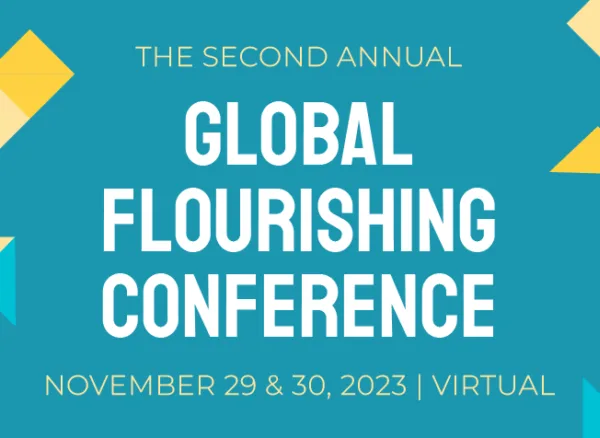Menu

Templeton World Charity Foundation has recently launched a new five year strategy to discover, develop, and launch innovations for human flourishing. As part of this, we are reaching out to leading scholars in a range of fields to learn how they think about and understand a concept as complex and multifaceted as human flourishing. Articles in this series are not intended to be definitive or limiting, rather, their purpose is to explore some of the many possible approaches to human flourishing. We invite readers to suggest additional perspectives as well. Tyler J. VanderWeele is the founder and director of The Human Flourishing Program at Harvard University’s Institute for Quantitative Social Science.
Human flourishing is a notoriously difficult concept to define, and an even more difficult thing to measure. Across history and cultures, it seems — at first glance — to be conceptualized in very different ways, and thus to defy efforts to find a common core. Indeed, when I began my career, I didn’t intend to explicitly and empirically study human flourishing. Flourishing was the province of philosophers and theologians. My interest in flourishing as a concept grew out of early research I had been doing on the connections between religious service attendance and health.
What we found — using the best data and methods available — was that religious service attendance had a big effect on suicide rates and mental health outcomes and even longevity in the populations we were studying. People who attended religious services were less likely to commit suicide and had better mental health overall. While theologians, pastors, imams, monks and rabbis the world over have known this intuitively for millennia, documenting and quantifying this effect scientifically as rigorously as we did was something new.
We want to bring the same rigor to studying concepts like meaning, purpose, character and social relationships as we would to studying income or physical health.
Although these findings clearly had public health implications, when we looked at the conversations and research going on within the public health community, we found that religion basically was not being considered at all. This was a clear gap in what was being considered in the context of public health. In thinking about what shapes health and well-being, our research also pointed to the concept of human flourishing as being much larger than simply the mitigation or treatment of diseases or economic growth in poor communities. It was this gap which led us to look beyond the constraints of individual fields of inquiry and to instead focus on the concept of “human flourishing.” For us, this requires an inherently interdisciplinary and holistic approach to studying humanity and what humanity aspires to be. We want to bring the same rigor to studying concepts like meaning, purpose, character and social relationships as we would to studying income or physical health.
Naturally, one of the first questions we had to tackle when founding The Human Flourishing Program at Harvard University — and that we are still dealing with on a daily basis — is what, exactly, we mean by human flourishing. I tend to equate the terms “human flourishing” and “complete human wellbeing.” Our working definition of flourishing is living in a state in which all aspects of a person’s life are good. Obviously, that’s very broad, and the understanding of goodness itself differs across cultures. So, in terms of empirical measurement and study of flourishing, we have chosen to focus on goals universally sought across religious, philosophical and cultural traditions.
From this starting point, we have proposed five domains of human life which we think, taken together, act as a reasonable measurement approach for capturing some of the major aspects of human flourishing. These five are:
Each of these domains are nearly universally desired in all cultures and religious traditions and across history, and we now have empirical data which indicates that today each is indeed a nearly universally desired state. Each of these domains also constitutes its own end — people seek out these things for their own sake — not just as a means to something else. We would not argue that flourishing is reducible to these five domains, but that whatever else flourishing might be understood to include, it would include these five domains as well. From this, we have constructed a flourishing measure based on the existing literature in those areas, and this measure asks two questions about each of those five domains, plus two additional questions on financial and material well-being, to determine whether or not someone has the means to sustain various aspects of flourishing over time.
Despite the progress that we have made, human flourishing is still not well understood, and we try to focus on under-studied areas in particular. Physical, mental and psychological health are better understood, and there are entire scientific fields devoted to searching for interventions to improve wellbeing in these areas. Likewise, economists have done considerable research in understanding the determinants of income and wealth.
Where research is particularly lacking are in the areas of character, meaning, purpose, virtue, and various aspects of social relationships. While these have long been the focus of philosophers and theologians, further interdisciplinary research — with richer measurement and assessment — is required to move beyond theory and concepts to findings backed by hard data and with an eye towards understanding how we can improve these aspects of flourishing at a population level. We also need to draw upon insights in philosophy and theology in the development of measures. For instance, most of the existing empirical literature tends to conflate meaning and purpose, but purpose is more end-directed and meaning is more about understanding the context for everything in your life.
Measurement of character is even more complicated, in part because of issues around self-reporting. Before we can draw empirical conclusions about character and how it contributes to flourishing, we first have to understand which questions work well in self-report. What questions will people answer honestly and which ones will they fudge the truth on? Put differently, how self-aware are subjects, and how can we take that into account?
To answer these questions, and fully understand human flourishing, interdisciplinary collaboration is key. Philosophers and theologians by themselves are unable to generate rigorous, empirical data to persuasively demonstrate contentions about flourishing to a broader audience, while scientists must access and understand the depth of knowledge and insight generated over millennia in the humanities and religious studies. Breaking down the borders between academic fields and practitioners and filling in key gaps in the literature is key to what we do. Only through continued collaboration will we one day, perhaps, more conclusively find the keys to the good life.


